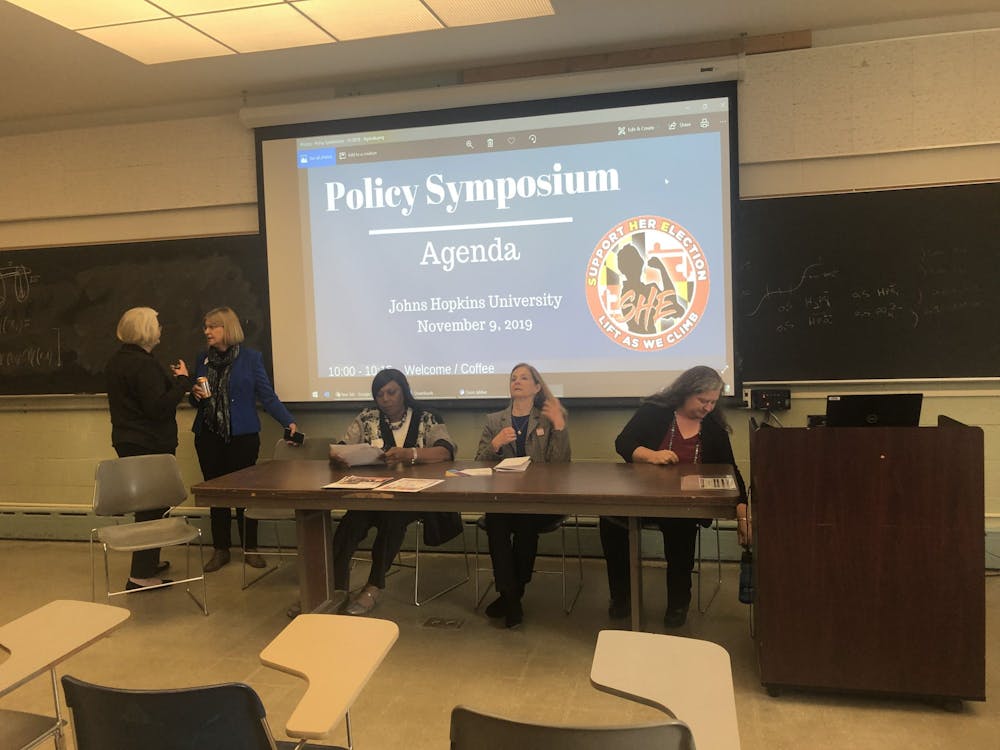The Hopkins College Democrats and Support Her Election (SHE), a Maryland grassroots organization that supports progressive female political candidates, co-hosted the inaugural SHE Policy Symposium on Saturday in Shaffer Hall. Three different panels convened to discuss climate change, immigration and women in politics.
The panelists on the immigration panel — Jill Marie Bussey, Becca Niburg and Krish O’Mara Vignarajah — discussed the changes that they have seen the Trump Administration execute.
Niburg is the pro-bono coordinating attorney of Kids in Need of Defense (KIND), an organization that represents unaccompanied minors in the immigration system. She argued that the most consequential change under the Trump Administration was the abandonment of the regular policy formulation and implementation.
“It’s not only the fear and discord sown within the public, but the policies that don’t have anything behind them,” she said. “It’s one of the reasons why we have children in warehouses, because these policies were put forth without any of the infrastructure... It’s creating chaos.”
Bussey, who is the advocacy director at the Catholic Legal Immigration Network Inc., said that she sees the shift in prevailing attitudes toward immigrants and refugees to be the largest change.
“What has changed under the Trump Administration is the fear mongering… the racism and xenophobia that have become institutionalized,” Bussey said.
Vignarajah, president and CEO of Lutheran Immigration and Refugee Service, emphasized the importance of speaking out against those forms of hatred and showing up.
Responsible citizens, she argued, have to voice their protest against destructive policies and ensuring that important issues are not ignored.
“We can be that silent majority, but if no one hears us they assume we’re a minority,” she said.
Bussey explained that she continues to hold on to some small measure of optimism that Americans are fundamentally decent. She argued that this is the same hope that continues to draw others to come and seek a better life in the U.S.
“Regardless of administration, this country still remains a beacon of hope for individuals — a place where people seek safety and refuge or attempt to do so,” she said.
Bussey said that meeting community members who fight for vulnerable immigrant populations — especially in the face of recent raids by U.S. Immigration and Customs Enforcement (ICE) — validates her optimism.
“What’s really heartening is that there are communities that are saying, ‘We won’t let that stand here; or, when ICE comes and they take mom away, we’ll take care of the family. We’ll make sure the children eat,’” she said.
Following the immigration panel, the symposium shifted into a panel on women in politics.
The panel was moderated by Diane Fink, the executive director of the Maryland chapter of Emerge America. Emerge is a national organization that helps female Democrats run for state and local office.
Fink explained the reasons behind the founding of Emerge and why it specifically caters to women.
“Women want to make differences because they have goals outside of themselves,” Fink said. “Very few women come into the world of politics with themselves in mind.”
The panel was composed of four women — Kate Smith Brodie, Ysela Bravo, Julia Nichols and Natalie Ziegler — who all ran for state or local office in Maryland in 2018.
Brodie won a seat on the Oakland Town Council, becoming the first black woman to hold elected public office in Garrett County.
Bravo, Nichols and Ziegler all ran for seats in the Maryland House of Delegates and lost.
All of the women had run in districts that were historically Republican and found that they shared similar experiences in running for office.
“I met wonderful people through campaigning. I found my voice through talking to voters and reaching out,” Bravo said. “I would tell anybody to do it again.”
Each of the women also offered insight as to why they decided to run in the first place.
Bravo, who is Mexican American, shared how being a woman of color specifically influenced her decision to seek office.
“The idea that white men understand all of their constituents is not right,” Bravo said. “I have so much more in common with constituents than the representatives.”
Brodie explained that some of the impetus she felt to run came from a similar sense of the disconnect between politics as usual and what she felt that they should be. This urge to run became particularly acute for her, she said, after the most recent presidential election.
“I was fed up and tired with the results of the 2016 election, and it fired me up,” Brodie said. “I did not think she could do it. SHE made me think I could do it.”
Vignarajah closed by sharing advice for women, particularly young women, getting involved in politics.
“Don’t let yourself get in your own way. Be engaged in communities, figure out how to always say yes. Opportunities present themselves when you’re out there,” she said.
In an interview with The News-Letter, two of the organizers shared how they believed the inaugural symposium had gone.
College Democrats Co-President Sylvana Shaffer said that overall she felt very positive despite the sparse attendance.
“The event went really well. We had a lot of people come from all over Maryland, who are doing really cool things in politics and law and activism,” Shaffer said. “Student turnout could’ve been higher, but I guess it was a Saturday morning and people are busy, so it’s understandable.”
Treasurer of the College Democrats Mario Aguirre echoed Shaffer’s sentiments. He also added his desire to see more student participation next year.
“The event was really good, it was a good time getting the community engaged. I hope we can do it again and get more students involved in the future” he said.
Coverage of the panel on climate change is on page B7.
Editor’s Note: Greta Maras was selected to participate in the College Democrats and College Republicans debate after contributing reporting and writing to this piece.





